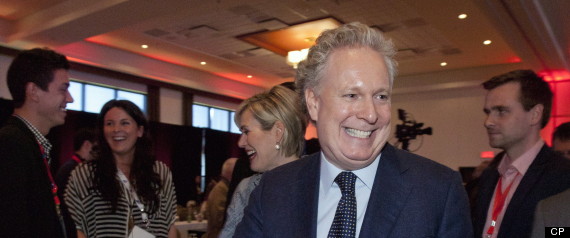VICTORIAVILLE – Shocking as the images were, nobody should have been surprised that there was a riot at the opening of the weekend meeting here of the Quebec Liberal Party.
The very reason the Liberals were meeting here was that, as Premier Charest acknowledged Sunday, they had been chased out of Montreal by the threat of violence.
| Quebec premier Jean Charest gives the closing adress at the convention of the Quebec Liberal Party in Victoriaville on Sunday May 6, 2012. |
The organizers’ invitations to the demonstration could be translated as calls for a demonstration of “general rage” at the Liberals and “disruption” of their meeting. And when the Liberals announced a week before the meeting that they were retreating to this town northeast of Montreal, the organizers chartered buses so that the protesters could follow them.
If the rioters’ intention on Friday was to prevent the meeting, their anti-democratic attack came close to succeeding.
Hooligans, some of them masked, got to within a few metres of the convention centre’s tall windows, through which Liberals peered anxiously, before charging Sûreté du Québec riot police pushed them back.
The rioters succeeded only in breaking one window with a thrown missile. Had they succeeded in breaking in, it would have created a dangerous situation.
Throughout the convention centre and the adjoining hotel, one couldn’t go anywhere without being in sight of at least one large man in a dark suit with an earpiece.
In a similar situation in 2000, when a goon squad of Montreal municipal blue-collar workers tried to crash a Parti Québécois national council meeting, bodyguards protecting PQ cabinet ministers instinctively reached under their jackets for their weapons. Fortunately, the goons were ejected without guns being drawn.
Here, once the rioters were repulsed and the meeting inside started after an hour delay, the Liberals appeared to be oblivious to the escalating violence occurring out of their sight. The only signs of it in the meeting were a faint, peppery odour seeping in through the ventilation and some mildly irritated eyes, noses, throats and lungs.
| Quebec Liberal convention a surreal weekend behind locked doors |
Much of the weekend meeting was surreal. Charest ignored the violence in his opening speech, as if it wasn’t happening. Instead, he defended a position on tuition that might no longer have existed, since the government was then negotiating with student representatives.
The next day, Finance Minister Raymond Bachand did the same, with the help of a slide presentation. Education Minister Line Beauchamp was supposed to have participated as well, but she was in Quebec City, possibly renegotiating the position Bachand was presenting.
When a delegate expressed concern that the government might be negotiating concessions to the “extremist” CLASSE, all Bachand could answer was “no comment.”
But when terms of what the government called an “agreement” and the students called an “offer” were disclosed on Saturday evening, it appeared that the delegate’s concern was unfounded.
 |
| Victoriaville, Quebec Liberal Convention: Party Calmly Resumes Event After Reaching Tentative Tuition Deal |
In effect, the government was challenging the students to prove that eliminating waste spending by the universities would make the tuition increases unnecessary. But the students would have to make their case in a council on which they would be outnumbered by university administrators defending their practices.
It looked as though the major labour organizations, tired of financing the student “strikes,” had put pressure on the student associations to submit an offer to their members that might give the “strikers” a face-saving pretext to return to class.
But it was far from certain that the “strikers,” who had held out in some cases for 12 weeks for the cancellation of the tuition increases, would accept the offer.
The student negotiators refused to recommend it to their members. The Charest government couldn’t sell cold beer to roofers spreading tar in a heat wave.
And the more Beauchamp, in particular, repeated that the tuition increases would be maintained and the students had gained nothing for sure, the more she risked convincing them to reject the proposal.

No comments:
Post a Comment